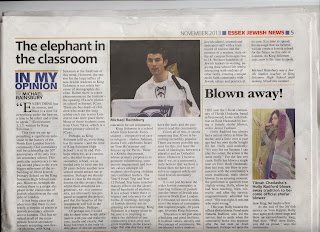This article was written in summer 2013 and was recently published by the Essex Jewish News (Chanukah edition).
“Everything
has its season, and there is a time for everything under the heaven...a time to
be silent and a time to speak”. (Ecclesiastes 3:1,7, written by King Solomon)
 In
2013, we are approaching a significant milestone in the history of the North
East London Jewish community. Our community will be celebrating the 20th
anniversary of its only Jewish secondary school. This particular anniversary is
taking second place to the even bigger milestone of the rebuilding of Ilford
Jewish Primary School on the King Solomon campus. However beneath the surface
there is a major elephant in the classrooms of Jewish education on the East
side of London.
In
2013, we are approaching a significant milestone in the history of the North
East London Jewish community. Our community will be celebrating the 20th
anniversary of its only Jewish secondary school. This particular anniversary is
taking second place to the even bigger milestone of the rebuilding of Ilford
Jewish Primary School on the King Solomon campus. However beneath the surface
there is a major elephant in the classrooms of Jewish education on the East
side of London.
It
has been clear to all observers that there is currently a surplus of places at
Jewish secondary schools across London. This has resulted in all of the
mainstream Jewish secondary schools accepting non-Jewish children, with King
Solomon at the forefront of this trend. However the reason for the large influx
of non-Jewish students in King Solomon is not solely because of demographic
decline. Rather there is a new phenomenon on the horizon – the opening of a new
pluralist school in Barnet, JCoss. There are busloads of children who make the
long schlep each day across London to take their place there. Many of these
students come from Clore Tikva School, which is a feeder primary school to JCoss.
Perhaps,
as King Solomon told us, everything has its season – and the time of King
Solomon High School’s is at its end. Perhaps when we as a community decided to
open a secondary school we only intended to have one for 20 years before
another new school would attract our attention. Perhaps we should make it clear
to the major donors for this project that whilst their donations are generous, we
as a community are ultimately not prepared to support the project, and that the
benefits of the investment will fall to the local populace. Perhaps.
Or
perhaps not. I would like to share some inside information with you and make
the case loudly and clearly that King Solomon is the only viable place
of Jewish secondary education for our community.
King
Solomon is a school which feels Jewish. Every student – irrespective of race or
religion – studies Judaism, learns Ivrit, celebrates Israel on Yom Ha’atzmaut
and dresses up for Purim. There is a Kehila department, whose primary purpose
is to promote volunteering, community engagement and Jewish values amongst all
students, developing children into confident leaders. The Year 9 Israel Trip
and Year 12 Poland Trip have transformatory effects on the identities of
hundreds of students. It is a school where there is respect and tolerance for
all faiths. If anything, feelings of Jewish identity are increasing not
decreasing. King Solomon is a happy place to be and it is inspiring to watch
the children of our community learn, play and grow together, in the knowledge
that one day they will have the tools and the passion to lead the community.
Given
all of this, it seems surprising that JCoss is becoming incredibly popular.
There are many possible reasons for this, not least the clash of ideologies
between a pluralist and an Orthodox ethos. However I believe that if we as a community
truly believe that we have a future then we have to resolve to solely support
our local Jewish secondary school.
It
is not just because the wider Jewish community is injecting millions of pounds
into the future of Jewish education in North East London. It is because we need
to rediscover the sense of community that inspired people 20 years ago to
create King Solomon.
Education
is not just about a building and good facilities. It is about values, identity
and the concept of community. We are blessed with a modern Jewish school,
talented and dedicated staff with a track record of success and the promise of
a modern state-of-the-art campus from ages 2-18. We have hundreds of Jewish
leaders-in-waiting enjoying their school life whilst interacting with students
of other faiths, creating a unique multifaith community with Jewish values and
practice at its core. It is time to spread the message that we believe we can
create a Jewish school for the future on this side of London. As King Solomon
says, now is the time to speak.